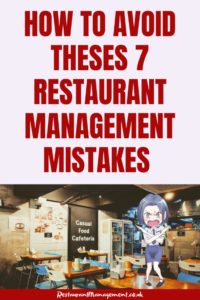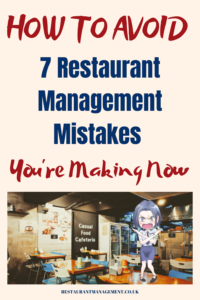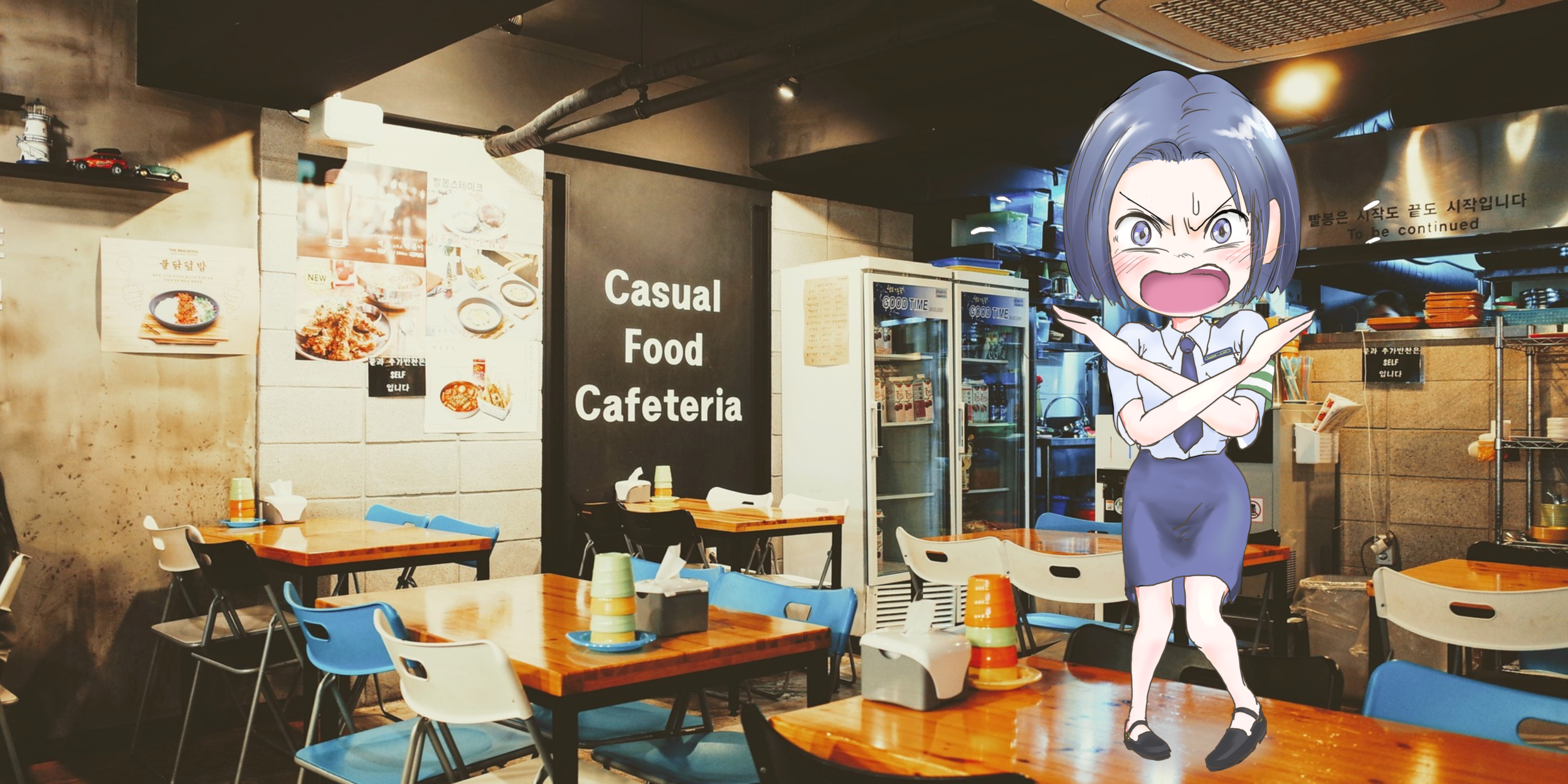Restaurant Management Mistakes
As a restaurant manager, you are responsible for ensuring the success of your establishment. However, in the fast-paced and ever-evolving restaurant industry, it is simple to make errors and a string of restaurant management mistakes can harm your bottom line.
UK Restaurant Market Report forecasts the sector’s value of £18.1bn in 2022 with over 160,000 establishments. With so much at stake, it is imperative that you stay ahead of the competition and avoid common errors that can harm your business.
Owning and operating a restaurant calls for extensive preparation and strategic thinking, as well as a great deal of hard work and effort to implement those strategies.
The success of your restaurant may be judged by the impression that you make on your customers the moment the customer walks through the doors.

Customers’ satisfaction with their dining experience is directly tied to the quality of management at the restaurant. In this business, the average first-year failure rate is around 60%, with 80% of restaurants closing within the first five years.
If only restaurant managers and owners would take note of these 7 restaurant management mistakes to avoid, many of these failures may be prevented. The majority of these problems can be avoided if restaurant managers and owners take a proactive approach rather than a reactive approach to these seven common mistakes.
In this post, we will discuss the most common restaurant management mistakes that you should avoid making.

Restaurant Management Mistakes And How To Avoid Them
Here are 7 restaurant management mistakes you’re probably making, along with solutions for avoiding them:
1. Poor Financial Management
Financial mismanagement is a widespread issue among UK restaurant managers.
This error can have severe and long-lasting repercussions, as it can lead to problems such as uncontrolled food and labour costs, cash flow mismanagement, and the inability to track and analyse crucial financial metrics.
This can significantly affect a restaurant’s financial health and stability. Over sixty per cent of restaurant owners and managers struggle with financial management, according to a recent report by the National Restaurant Association.
This highlights how important it is for the restaurant industry to have sound financial management practices in place in order to be successful.

2. Overlooking Inventory Management
Inventory management is a crucial aspect of running a successful restaurant, but it is frequently neglected.
According to a study conducted by the National Restaurant Association, restaurant owners who do not regularly track their inventory waste an average of 10 per cent of their food, resulting in decreased profits and negative environmental effects.
To avoid this, be careful to keep accurate records of what is currently in stock and what must be ordered. This can be done manually or with software for inventory management.
3. Overlooking Employee Training and Development
Failure to invest in employee training and development is one of the most common errors made by restaurant managers.
This can lead to inconsistency in food preparation, customer service, and restaurant operations as a whole. According to the results of a recent poll conducted by the National Restaurant Association, forty percent of restaurant managers believe that the lack of training among their staff members presents the most significant barrier to running a successful restaurant.
Ensure that your employees receive regular training, both on the job and through formal off-the-job training programmes, to avoid this error. This will assist them in developing the necessary skills to excel in their roles and provide excellent customer service.
Your staff is the face of your restaurant, so training them properly is essential to your success. Inadequate training in proper procedures, customer service, and food preparation can result in errors, customer complaints, and decreased profits.
The renowned restaurateur Danny Meyer said, “Hospitality is not a department; it’s an attitude”.
To avoid this, be sure to invest time and resources in training your employees and evaluate their performance frequently.
Related articles
Most Common Reasons Restaurants Fail
Your Restaurant Is About To Fail
How To Improve Restaurant Profits
Restaurant Management Strategies
Restaurant Inventory Management System
4. Ignoring the Power of Marketing and Advertising
Marketing and advertising are crucial for the success of any business, including restaurants. If you are not effectively utilising these tools, you are likely losing potential customers. 70% of consumers, according to a survey by the Institute of Practitioners in Advertising, view advertising as an essential source of information when making a purchase.
To avoid this, ensure you have a well-defined marketing strategy and regularly assess the efficacy of your advertising campaigns.
5. Overlooking Customer Feedback
Ignoring customer feedback is another common error made by restaurant managers. This can ultimately result in a decline in customer satisfaction and lower sales.
Unsatisfied customers are less likely to return to a restaurant, according to a study conducted by the Centre for Hospitality Research.
Customers are the lifeblood of any business, and ignoring their feedback can result in decreased profits and dissatisfied customers. 96% of respondents to a TripAdvisor survey said they would return to a restaurant after a positive experience.
Ensure that you regularly collect and analyse customer feedback to avoid this error. This can be accomplished through online reviews, customer surveys, or even direct communication with customers.
This will allow you to identify areas for improvement and implement measures to improve the customer experience in order to grow your business.

6. Failing to Keep Up with Industry Changes
The restaurant industry is in a constant state of change, and failure to adapt can be detrimental to your bottom line.
Constantly emerging technologies, trends, and customer expectations make it essential to stay ahead of the curve.
In a survey conducted by the National Restaurant Association, 59% of restaurant owners identified keeping up with industry trends as their greatest challenge.
Staying abreast of the latest food and beverage trends, technologies, and marketing strategies is essential for business success.
Therefore, to avoid making these errors, you must regularly attend industry conferences, read trade publications, and network with other restaurant professionals.
This will help you stay up to date on the latest industry trends and best practices, so you can make smart decisions about how to run your restaurant successfully.

7. Failure to promote a positive work environment
A negative workplace culture can have a significant effect on employee morale and job satisfaction, resulting in high employee turnover and low productivity.
According to a survey conducted by the Centre for Hospitality Research, positive workplace culture is one of the most important factors in retaining restaurant employees.
To avoid this error, foster a positive workplace culture by treating your employees with respect, providing fair compensation and benefits, and promoting open communication and collaboration. This will help you keep your best employees and create a happy, productive work environment.
Conclusion
In conclusion, the restaurant industry can be highly competitive and unforgiving, but success is attainable with the proper knowledge and preparation.
By avoiding these 7 restaurant management mistakes you’re making now, you can enhance your operations, increase customer satisfaction, and ultimately achieve your objectives.
Remember to remain vigilant, informed, and customer-focused, and you will be well on your way to achieving success.
FAQ’s
What is the most common mistake that restaurants make?
One of the most common mistakes restaurants make is inconsistency, particularly in food quality and service. Maintaining consistent quality and service is crucial for customer retention and reputation.
What is the biggest problem in the restaurant industry?
The restaurant industry is a challenging and competitive field. The biggest problems can vary depending on the context, but widespread issues include high employee turnover rates, rising operational costs (such as food and labour costs), and increasing competition from delivery services and alternative dining options like meal kits and food trucks. These challenges require constant adaptation and innovation to stay ahead.
Why is being a restaurant manager so stressful?
Restaurant management involves juggling numerous responsibilities, including overseeing operations, managing staff, handling customer complaints, and ensuring profitability. The fast-paced environment, long hours, and pressure to maintain high standards can contribute to stress for restaurant managers.
What makes good management at a restaurant?
Effective communication is not just a skill, but a necessity in good restaurant management. It’s about more than just setting clear expectations for staff and addressing issues promptly. It’s about fostering a positive work culture, providing training and support, and monitoring performance. Strong management also involves being adaptable and proactive in addressing challenges as they arise. In short, effective communication is the backbone of successful restaurant management.
How do you talk to guests as a restaurant manager?
As a restaurant manager, being courteous, attentive, and professional when interacting with guests is essential. When someone expresses their concerns or feedback, actively listen and respond empathetically to resolve any issues. Offer assistance or recommendations as needed, and ensure guests feel valued and appreciated for choosing your restaurant. Additionally, maintaining a friendly demeanour and positive attitude can go a long way in creating a welcoming atmosphere for guests.



